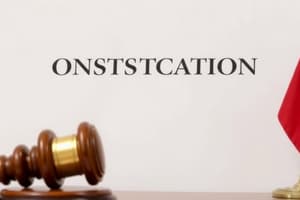Podcast
Questions and Answers
¿Cuáles son las dos formas en que los españoles pueden participar en la vida política?
¿Cuáles son las dos formas en que los españoles pueden participar en la vida política?
- Votando y participando en asambleas
- Presentando candidaturas y formando partidos políticos
- Participando en manifestaciones y presentando demandas
- Votando y presentando su candidatura (correct)
¿Qué derecho tienen los españoles si consideran que sus derechos han sido violados?
¿Qué derecho tienen los españoles si consideran que sus derechos han sido violados?
- Tienen derecho a ir a la policía
- Tienen derecho a pedir compensación económica
- Tienen derecho a ir a juicio (correct)
- Tienen derecho a presentar una queja formal
¿Qué deben garantizar los juicios en España?
¿Qué deben garantizar los juicios en España?
- Que haya un jurado popular en todos los casos
- Que los acusados tengan derecho a defenderse adecuadamente (correct)
- Que sean rápidos y sin apelaciones
- Que se mantenga en secreto el contenido del juicio
¿Quiénes pueden condenar a una persona en España?
¿Quiénes pueden condenar a una persona en España?
¿Qué derecho tiene una persona encarcelada en relación a su trabajo?
¿Qué derecho tiene una persona encarcelada en relación a su trabajo?
¿Qué prohíben los tribunales de honra en España?
¿Qué prohíben los tribunales de honra en España?
¿Cuál es el objetivo de la educación en España?
¿Cuál es el objetivo de la educación en España?
¿Qué tipo de educación es obligatoria y gratuita en España?
¿Qué tipo de educación es obligatoria y gratuita en España?
¿Qué fundamento describe la forma en que las Administraciones Públicas deben actuar rápida y correctamente?
¿Qué fundamento describe la forma en que las Administraciones Públicas deben actuar rápida y correctamente?
¿Cuál de los siguientes aspectos se asocia a la jerarquía en la Administración?
¿Cuál de los siguientes aspectos se asocia a la jerarquía en la Administración?
La descentralización permite que...
La descentralización permite que...
¿Qué diferencia a la desconcentración de la descentralización?
¿Qué diferencia a la desconcentración de la descentralización?
¿Qué principio asegura que la administración trabaja dentro de un marco legal?
¿Qué principio asegura que la administración trabaja dentro de un marco legal?
En un colegio, ¿quién ocuparía el nivel más alto en la jerarquía administrativa?
En un colegio, ¿quién ocuparía el nivel más alto en la jerarquía administrativa?
¿Qué implica el principio de coordinación en la Administración?
¿Qué implica el principio de coordinación en la Administración?
El principio de eficacia busca reducir el número de documentos requeridos en qué proceso específico?
El principio de eficacia busca reducir el número de documentos requeridos en qué proceso específico?
¿Qué implica la coordinación en la Administración?
¿Qué implica la coordinación en la Administración?
¿Cuál es la función principal de la administración según el principio de legalidad?
¿Cuál es la función principal de la administración según el principio de legalidad?
¿Cómo se clasifican las Administraciones en España según el territorio?
¿Cómo se clasifican las Administraciones en España según el territorio?
¿Qué representa la Administración central en el contexto del territorio español?
¿Qué representa la Administración central en el contexto del territorio español?
¿Cuál es el rol de la Xunta de Galicia en la gestión educativa?
¿Cuál es el rol de la Xunta de Galicia en la gestión educativa?
¿Qué debe hacer la Dirección General de Tráfico al recibir una solicitud de permiso de conducir?
¿Qué debe hacer la Dirección General de Tráfico al recibir una solicitud de permiso de conducir?
¿Qué sucede si las diferentes administraciones no se coordinan?
¿Qué sucede si las diferentes administraciones no se coordinan?
¿Qué ejemplos de territorios se mencionan en relación a la clasificación de las Administraciones en España?
¿Qué ejemplos de territorios se mencionan en relación a la clasificación de las Administraciones en España?
¿Qué órgano forma parte del ayuntamiento?
¿Qué órgano forma parte del ayuntamiento?
¿Cuál es la principal diferencia entre una diputación provincial y un cabildo insular?
¿Cuál es la principal diferencia entre una diputación provincial y un cabildo insular?
¿Cuál es la función principal de la Administración General del Estado?
¿Cuál es la función principal de la Administración General del Estado?
¿Quiénes son parte de la diputación provincial?
¿Quiénes son parte de la diputación provincial?
¿Qué determina el Estatuto de Autonomía de una comunidad?
¿Qué determina el Estatuto de Autonomía de una comunidad?
¿Qué deber cumplir la policía nacional en cualquier parte de España?
¿Qué deber cumplir la policía nacional en cualquier parte de España?
¿Qué características forma parte de los principios de la Administración Pública española?
¿Qué características forma parte de los principios de la Administración Pública española?
¿Qué tipo de administración actúa en el territorio de un municipio?
¿Qué tipo de administración actúa en el territorio de un municipio?
¿Cuál de las siguientes afirmaciones sobre las comunidades autónomas es correcta?
¿Cuál de las siguientes afirmaciones sobre las comunidades autónomas es correcta?
¿Cuántas comunidades autónomas y ciudades autónomas existen en España?
¿Cuántas comunidades autónomas y ciudades autónomas existen en España?
¿Qué administración actúa en un municipio?
¿Qué administración actúa en un municipio?
¿Cuál es un deber fundamental según la Constitución Española de 1978?
¿Cuál es un deber fundamental según la Constitución Española de 1978?
¿Qué tipo de asuntos puede decidir una comunidad autónoma según su Estatuto de Autonomía?
¿Qué tipo de asuntos puede decidir una comunidad autónoma según su Estatuto de Autonomía?
¿Qué tipo de administración pública se encarga de regular toda una provincia?
¿Qué tipo de administración pública se encarga de regular toda una provincia?
La Administración autonómica es organizada por:
La Administración autonómica es organizada por:
¿Qué incluye el Estatuto de Autonomía?
¿Qué incluye el Estatuto de Autonomía?
¿Cuál es la sede de la Administración central de Galicia?
¿Cuál es la sede de la Administración central de Galicia?
¿Cuál de las siguientes es una función de las secretarías generales?
¿Cuál de las siguientes es una función de las secretarías generales?
¿Qué tipo de órganos están incluidos en la Administración central?
¿Qué tipo de órganos están incluidos en la Administración central?
¿Quién decide sobre el número de consellerías y sus funciones?
¿Quién decide sobre el número de consellerías y sus funciones?
¿Qué tipo de órganos de dirección pueden existir dentro de la Administración central?
¿Qué tipo de órganos de dirección pueden existir dentro de la Administración central?
¿Cómo se clasifican los órganos de la Administración general de la Comunidad Autónoma de Galicia?
¿Cómo se clasifican los órganos de la Administración general de la Comunidad Autónoma de Galicia?
¿Qué órgano es considerado el más importante dentro de los órganos superiores de Galicia?
¿Qué órgano es considerado el más importante dentro de los órganos superiores de Galicia?
¿Cuál de las siguientes consellerías NO está incluida en la lista proporcionada?
¿Cuál de las siguientes consellerías NO está incluida en la lista proporcionada?
Flashcards
Spanish Political Participation
Spanish Political Participation
Spaniards can participate in politics by voting in elections and running for positions like mayor or member of parliament.
Right to a Fair Trial
Right to a Fair Trial
Spanish citizens have the right to a fair trial, where they are presumed innocent until proven guilty. This includes access to a lawyer, and a public hearing.
Judicial Condemnation
Judicial Condemnation
Only judges can impose sentences. Punishments must be based on laws from the present, not obsolete ones.
Prisoner's Rights
Prisoner's Rights
Signup and view all the flashcards
Honour Tribunals
Honour Tribunals
Signup and view all the flashcards
Right to Education
Right to Education
Signup and view all the flashcards
Education's Purpose
Education's Purpose
Signup and view all the flashcards
Fundamental Rights
Fundamental Rights
Signup and view all the flashcards
Decentralization (of power)
Decentralization (of power)
Signup and view all the flashcards
Coordination (in administration)
Coordination (in administration)
Signup and view all the flashcards
Principle of Legal Authority
Principle of Legal Authority
Signup and view all the flashcards
Spanish Administration Levels
Spanish Administration Levels
Signup and view all the flashcards
Central Administration
Central Administration
Signup and view all the flashcards
Autonomous Community
Autonomous Community
Signup and view all the flashcards
Local Administration
Local Administration
Signup and view all the flashcards
Territorial level
Territorial level
Signup and view all the flashcards
Administrative Efficiency
Administrative Efficiency
Signup and view all the flashcards
Administrative Hierarchy
Administrative Hierarchy
Signup and view all the flashcards
Administrative Decentralization
Administrative Decentralization
Signup and view all the flashcards
Administrative Deconcentration
Administrative Deconcentration
Signup and view all the flashcards
Administrative Coordination
Administrative Coordination
Signup and view all the flashcards
Principle of Legal Adequacy
Principle of Legal Adequacy
Signup and view all the flashcards
Hierarchy in Education
Hierarchy in Education
Signup and view all the flashcards
Example of Decentralization
Example of Decentralization
Signup and view all the flashcards
Local Administration
Local Administration
Signup and view all the flashcards
Central Administration
Central Administration
Signup and view all the flashcards
Autonomic Administration
Autonomic Administration
Signup and view all the flashcards
Spanish Autonomous Communities
Spanish Autonomous Communities
Signup and view all the flashcards
Statute of Autonomy
Statute of Autonomy
Signup and view all the flashcards
Community Powers
Community Powers
Signup and view all the flashcards
Municipal Level
Municipal Level
Signup and view all the flashcards
Provincial Level
Provincial Level
Signup and view all the flashcards
Local Administration
Local Administration
Signup and view all the flashcards
Provincial Administration
Provincial Administration
Signup and view all the flashcards
Island Administration (Canaries/Baleares)
Island Administration (Canaries/Baleares)
Signup and view all the flashcards
Municipal Government
Municipal Government
Signup and view all the flashcards
Central Administration
Central Administration
Signup and view all the flashcards
Autonomous Community
Autonomous Community
Signup and view all the flashcards
Spanish Administration Levels
Spanish Administration Levels
Signup and view all the flashcards
Principles of Spanish Administration
Principles of Spanish Administration
Signup and view all the flashcards
Central Administration in Galicia
Central Administration in Galicia
Signup and view all the flashcards
Superior Organs
Superior Organs
Signup and view all the flashcards
Conselleria
Conselleria
Signup and view all the flashcards
Territorial Administration
Territorial Administration
Signup and view all the flashcards
Secretaría General
Secretaría General
Signup and view all the flashcards
Órganos de Dirección
Órganos de Dirección
Signup and view all the flashcards
Santiago de Compostela
Santiago de Compostela
Signup and view all the flashcards
Number of Consellerías
Number of Consellerías
Signup and view all the flashcards
Study Notes
Contenido del Temario
- El temario se divide en 2 bloques: Parte General y Parte Específica.
- La Parte General incluye los temas 1 y 2.
- El Tema 1 trata sobre la Constitución Española de 1978, incluyendo principios fundamentales, derechos y deberes fundamentales de los españoles, la administración y sus niveles.
- El Tema 2 aborda el Estatuto de Autonomía de Galicia, incluyendo el Parlamento, la Xunta, su presidente y la organización de la administración de la Comunidad Autónoma.
La Parte Específica
- Incluye los temas 3, 4, 1, 2 y 3.
- El Tema 3 se centra en la Ley 2/2015, del empleo público de Galicia, incluyendo los empleados públicos (tipos, derechos y obligaciones) y el ingreso en la administración pública.
- El Tema 4 trata sobre la igualdad, la transparencia y la prevención de riesgos laborales en la Administración Pública.
- El Tema 1 de la parte específica se refiere a la lavandería de un centro residencial.
- El Tema 2 de la parte específica se refiere a la limpieza de cuartos y zonas comunes en un centro residencial.
- El Tema 3 de la parte específica se refiere a la elaboración y condimentación de menús sencillos, la colocación y el servicio de las mesas de los comensales.
- El Tema 4 de la parte especifica se refiere a la limpieza del mantenimiento de las cocinas.
- El Tema 5 trata sobre las funciones del personal de limpieza, la seguridad e higiene en el trabajo.
- El Tema 6 se refiere a la limpieza de cuartos y zonas comunes, incluyendo cuartos de baño, elementos y limpieza.
- El Tema 7 trata sobre la limpieza de armarios, paredes, ventanas, pisos, talleres y laboratorios.
Studying That Suits You
Use AI to generate personalized quizzes and flashcards to suit your learning preferences.
Related Documents
Description
Este cuestionario abarca los temas relevantes de la administración pública en Galicia, incluyendo la Constitución Española de 1978 y el Estatuto de Autonomía de Galicia. También se exploran las leyes relacionadas con el empleo público y la organización administrativa. Prepárate para evaluar tus conocimientos sobre estos importantes temas legislativos y administrativos.




